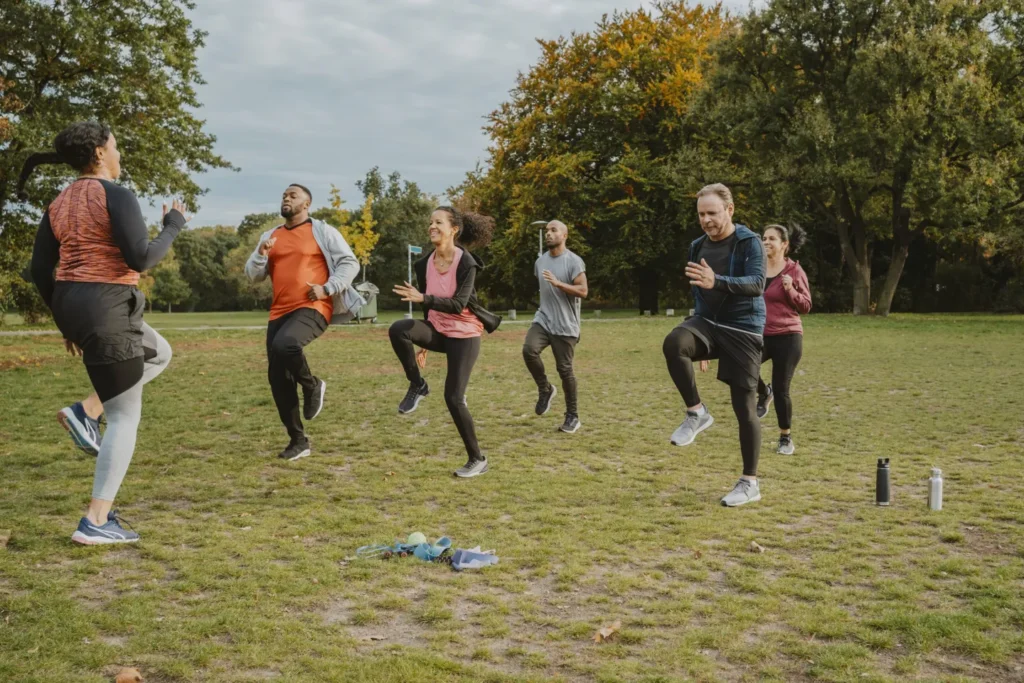Fitness
“Plant-Based Diets: Can They Really Improve Your Health?”

In recent years, plant-based diets have surged in popularity, with many people adopting them for health, ethical, and environmental reasons. But amidst the hype, one question remains—can plant-based diets really improve your health? Let’s dive into the science behind these diets and see what benefits they offer.
Plant-Based Diets: Can They Really Improve Your Health?

What Is a Plant-Based Diet?
A plant-based diet focuses on consuming foods primarily derived from plants. This includes fruits, vegetables, grains, nuts, seeds, and legumes. While many people think of a plant-based diet as strictly vegan or vegetarian, it can also include small amounts of animal products, depending on personal preferences. The key idea is to prioritize plant-based foods over animal-based ones.
Health Benefits of Plant-Based Diets
Research increasingly supports the health benefits of plant-based diets, with many studies showing improvements in various areas of well-being. Here’s a closer look at some of the most significant health benefits associated with adopting this lifestyle:
1. Lower Risk of Chronic Diseases
Plant-based diets are packed with nutrients that help reduce the risk of chronic illnesses such as heart disease, type 2 diabetes, and certain cancers. Diets rich in fruits, vegetables, and whole grains are high in antioxidants, fiber, and phytochemicals, which play a crucial role in protecting the body from disease.
For instance, the American Heart Association has highlighted that plant-based diets can significantly reduce the risk of heart disease. The fiber found in plants helps lower cholesterol levels and blood pressure, while antioxidants work to reduce inflammation in the body—key factors in preventing heart-related illnesses.
2. Better Weight Management
Many people who switch to a plant-based diet notice an improvement in their weight management. Plant-based foods tend to be lower in calories and higher in fiber, which keeps you feeling full for longer periods. The increased fiber intake also helps regulate digestion and prevent overeating.
A study published in The Lancet found that individuals who followed plant-based diets had lower body mass indexes (BMIs) and were less likely to be overweight compared to those who consumed animal-based products regularly.
3. Improved Digestion
Fiber plays a central role in digestive health, and plant-based diets are naturally high in it. Eating plenty of fiber-rich fruits, vegetables, and whole grains can support healthy digestion by promoting regular bowel movements and preventing constipation. Moreover, a healthy gut microbiome—important for overall health—is often associated with a plant-rich diet.
4. Enhanced Mental Well-being
While physical health is the primary focus, plant-based diets may also positively impact mental health. Research shows a connection between diet and mental well-being. Diets rich in whole, unprocessed plant foods are linked to reduced symptoms of anxiety and depression. The nutrients in plants, such as vitamins, minerals, and antioxidants, support brain function and mental health.
A study from Nutritional Neuroscience found that individuals who adopted a plant-based diet experienced improvements in mood and lower stress levels. Omega-3 fatty acids, found in nuts and seeds, play a role in brain health, potentially reducing the risk of cognitive decline.
Nutritional Considerations for Plant-Based Diets
While plant-based diets offer numerous health benefits, they also require careful planning to avoid potential nutritional deficiencies. If not done properly, it’s easy to miss out on essential nutrients such as:
- Protein: Many people worry about getting enough protein on a plant-based diet. However, plants like legumes, lentils, quinoa, and tofu are excellent protein sources. It’s important to consume a variety of these foods to meet protein needs.
- Vitamin B12: This vitamin is typically found in animal products, so people following strict plant-based diets need to find alternative sources like fortified foods or supplements to avoid deficiency.
- Iron and Calcium: Although iron and calcium are present in plant foods like leafy greens, seeds, and legumes, they are not as easily absorbed as those from animal sources. Incorporating foods rich in vitamin C can help boost iron absorption, while fortified plant-based milks can ensure adequate calcium intake.
- Omega-3 Fatty Acids: Essential for heart and brain health, omega-3s can be found in flaxseeds, chia seeds, and walnuts. Since plant sources of omega-3s differ from those in fish, some may opt for algae-based supplements to meet their needs.
Making the Transition to a Plant-Based Diet
Transitioning to a plant-based diet doesn’t have to be overwhelming. Here are some tips to get started:
Plant-Based Diets: Can They Really Improve Your Health?

- Start Slowly: Begin by incorporating more plant-based meals into your diet gradually. You don’t need to go 100% plant-based overnight. Even adopting a “flexitarian” approach—where you prioritize plant foods while still eating occasional animal products—can improve health.
- Plan Balanced Meals: Ensure each meal contains a good balance of protein, healthy fats, and complex carbohydrates. This will help keep you energized and satisfied throughout the day.
- Experiment with New Recipes: Trying new recipes and ingredients can make the transition enjoyable. Explore different ways to prepare plant-based foods to keep meals exciting and flavorful.
- Stay Informed: Learn about plant-based nutrition and ensure you are meeting your nutrient needs. Consulting a registered dietitian can also be helpful, especially if you’re transitioning to a more restrictive diet like veganism. joyfulroamers.com
Conclusion: A Path to Better Health?
A plant-based diet can undoubtedly improve health by reducing the risk of chronic diseases, promoting better weight management, and supporting both mental and physical well-being. However, to reap the full benefits, it’s essential to plan meals carefully to avoid missing out on key nutrients. Whether you choose to fully embrace plant-based eating or simply incorporate more plant foods into your diet, the evidence suggests that it can be a powerful step toward better health.
Fitness
How to Stay Motivated on Your Fitness Journey: Tips and Tricks from the Experts

Embarking on a fitness journey is exciting. You’ve set your goals, created a workout routine, and are ready to transform your body and mind. But staying motivated throughout the process can be challenging. Life gets busy, progress might feel slow, and it’s easy to lose steam. However, motivation is key to long-term success. joyfulroamers.com
How to Stay Motivated on Your Fitness Journey: Tips and Tricks from the Experts

In this blog, we’ll explore expert-backed strategies to help you stay on track, even when the going gets tough.
1. Set Realistic Goals
Setting clear and achievable goals is essential for maintaining motivation. Fitness experts suggest breaking your larger goal into smaller, more manageable milestones. For example, instead of saying, “I want to lose 30 pounds,” start with, “I want to lose 5 pounds in the next month.”
By breaking your fitness goals into smaller steps, you create a sense of achievement as you check off each milestone. Celebrating these small wins keeps you focused and motivated to continue your journey.
Expert Tip: Use the SMART goal-setting framework (Specific, Measurable, Achievable, Relevant, and Time-bound) to ensure your goals are clear and realistic.
2. Track Your Progress
Tracking your progress is another powerful way to stay motivated. Whether it’s by keeping a workout journal, using a fitness app, or taking progress photos, having a record of your improvements can be incredibly encouraging.
Fitness coach Jordan Syatt explains that seeing tangible progress, even if it’s small, keeps you going. Whether you’re lifting heavier weights, running faster, or noticing physical changes, tracking allows you to celebrate how far you’ve come rather than focusing on how far you still have to go.
Expert Tip: Regularly reviewing your progress can help you adjust your workout plan and stay aligned with your goals.
3. Find an Accountability Partner
One of the most effective ways to stay motivated is by involving someone else in your fitness journey. Whether it’s a friend, family member, or personal trainer, having an accountability partner ensures you have someone to encourage and support you.
Fitness expert Jillian Michaels emphasizes the power of community. “When you have someone checking in on you, it’s harder to skip workouts or fall off the wagon,” she says. You can also share your successes and challenges, making the journey more enjoyable and sustainable.
Expert Tip: If you don’t have a workout buddy, consider joining a fitness class or online community where you can connect with others pursuing similar goals.
4. Mix Up Your Routine
Variety is the spice of life—and your workout routine. Doing the same exercises every day can quickly become monotonous, leading to boredom and burnout. To avoid this, fitness experts recommend switching things up regularly.
Incorporating different types of exercises, such as strength training, yoga, cycling, or HIIT, keeps things fresh and exciting. This not only prevents boredom but also challenges your body in new ways, leading to better results.
Fitness trainer Kelsey Wells suggests trying a new workout style every 4-6 weeks to keep both your mind and body engaged.
Expert Tip: Don’t be afraid to step out of your comfort zone. Trying new activities, such as rock climbing or dance classes, can reignite your passion for fitness.
5. Focus on How You Feel, Not Just How You Look
One common pitfall in fitness journeys is placing too much emphasis on physical appearance. While it’s natural to want to look better, focusing solely on aesthetics can lead to frustration, especially if you don’t see immediate results.
Fitness experts advise shifting your mindset to prioritize how you feel. Do you have more energy? Are you sleeping better? Is your mood improving? These non-physical benefits of exercise are often more immediate and long-lasting than changes in your appearance.
Personal trainer Ben Carpenter says, “Fitness is about feeling good in your body. When you focus on how your body feels and the health benefits you’re gaining, motivation becomes easier.”
Expert Tip: Keep a journal of how you feel after workouts—both mentally and physically. This can serve as a reminder of the broader benefits of your fitness routine.
6. Reward Yourself
Celebrating milestones with rewards can be a great motivator. Fitness experts recommend rewarding yourself for hitting your goals, whether it’s completing a workout streak, reaching a new personal best, or sticking to your nutrition plan.
The reward doesn’t have to be extravagant. It could be something as simple as buying new workout gear, treating yourself to a massage, or having a cheat meal. The key is to create positive reinforcement that encourages you to keep pushing forward.
Expert Tip: Choose rewards that support your fitness journey. For example, investing in a new pair of running shoes or a fitness tracker can boost your motivation and performance.
7. Make Fitness Fun
Fitness shouldn’t feel like a chore. Experts agree that the best way to stay motivated is by making exercise enjoyable. Find activities that you genuinely like and look forward to, whether it’s dancing, hiking, swimming, or playing a sport.
Celebrity trainer Autumn Calabrese suggests incorporating music, podcasts, or fitness challenges to make your workouts more fun. When you enjoy what you’re doing, exercise feels less like a task and more like something you want to do.
Expert Tip: Change your mindset from “I have to work out” to “I get to work out.” This shift can help you embrace exercise as a privilege rather than a burden.
How to Stay Motivated on Your Fitness Journey: Tips and Tricks from the Experts

8. Prioritize Recovery and Rest
Finally, remember that rest and recovery are crucial parts of any fitness journey. Overtraining can lead to burnout, injuries, and loss of motivation. Fitness experts emphasize the importance of taking rest days, getting enough sleep, and listening to your body.
Physical therapist Dr. Kelly Starrett advises incorporating active recovery techniques like stretching, foam rolling, or low-intensity activities like walking to stay engaged while allowing your muscles to recover.
Expert Tip: Schedule rest days in your workout plan just like you schedule your workouts. This ensures you give your body the time it needs to repair and come back stronger.
Conclusion
Staying motivated on your fitness journey requires a combination of goal-setting, tracking, variety, and self-compassion. By implementing these expert-backed strategies, you’ll be better equipped to overcome challenges and keep pushing forward toward your goals.
How to Stay Motivated on Your Fitness Journey: Tips and Tricks from the Experts
Fitness
The Connection Between Fitness and Longevity: Exercise Your Way to a Longer Life

In today’s fast-paced world, the quest for a longer, healthier life has gained immense popularity. While diet, stress management, and genetics all play crucial roles, one factor stands out consistently in scientific research: fitness. Regular exercise is not just about losing weight or building muscle; it is one of the most powerful tools we have to extend our lifespan.
The Connection Between Fitness and Longevity: Exercise Your Way to a Longer Life

How Fitness Impacts Longevity
The relationship between physical activity and longevity has been studied extensively. Research has shown that regular exercise reduces the risk of various chronic diseases, boosts mental health, and enhances overall well-being, all of which contribute to a longer, healthier life. Here’s how fitness plays a pivotal role: joyfulroamers.com
- Cardiovascular Health: Cardiovascular diseases, including heart disease and stroke, are leading causes of death globally. Engaging in regular aerobic activities such as walking, cycling, swimming, and running strengthens the heart and improves circulation. This helps lower blood pressure, cholesterol levels, and reduces the risk of plaque build-up in arteries, significantly extending life expectancy.
- Maintaining a Healthy Weight: Obesity is a major risk factor for many life-threatening conditions, including diabetes, heart disease, and certain cancers. Exercise helps regulate body weight by burning calories and increasing metabolism. By preventing obesity, you decrease the chances of developing these chronic diseases, contributing to a longer life.
- Reduced Inflammation: Chronic inflammation has been linked to numerous age-related diseases, such as Alzheimer’s, cancer, and arthritis. Regular physical activity helps regulate the immune system, reducing inflammation and enhancing the body’s ability to fight off infections and diseases.
- Improved Metabolic Health: Exercise plays a critical role in improving insulin sensitivity and glucose metabolism, which are essential for preventing type 2 diabetes. Even a moderate level of physical activity can help regulate blood sugar levels and improve metabolic health, reducing the risk of diabetes-related complications that could shorten life expectancy.
The Role of Strength Training in Longevity
While cardiovascular exercises like jogging and swimming get most of the attention, strength training is equally important for longevity. As we age, we naturally lose muscle mass, which can lead to weakness, frailty, and an increased risk of falls and fractures. Engaging in regular resistance training can help maintain and even build muscle, improving balance and mobility.
Strength training also supports bone health by increasing bone density, reducing the risk of osteoporosis. This is particularly crucial for older adults who are more prone to fractures. By preserving muscle mass and bone strength, strength training plays a direct role in enhancing both the quality and length of life.
Mental Health and Longevity
Physical fitness doesn’t just improve the body; it has profound effects on mental health as well. The connection between mental health and longevity is well-established, and exercise plays a critical role in this area. Regular physical activity has been shown to reduce symptoms of depression, anxiety, and stress, all of which can have detrimental effects on both mental and physical health.
Exercise promotes the release of endorphins, often referred to as “feel-good” hormones. These hormones improve mood, reduce pain, and provide a sense of well-being. Additionally, staying active helps improve cognitive function, reducing the risk of neurodegenerative diseases like Alzheimer’s and dementia. Mental sharpness and emotional stability are vital for enjoying a long and fulfilling life, making fitness an essential component of healthy aging.
Fitness and Cellular Aging
A lesser-known but equally fascinating area of research connects fitness to the molecular and cellular mechanisms of aging. One such mechanism involves telomeres, the protective caps at the ends of our chromosomes. As we age, these telomeres shorten, contributing to cellular aging and the onset of age-related diseases. However, studies have shown that regular exercise can slow down the shortening of telomeres, effectively delaying cellular aging and promoting longevity.
Another cellular benefit of exercise is improved mitochondrial function. Mitochondria are the powerhouses of our cells, responsible for producing energy. As we age, mitochondrial function declines, leading to decreased energy levels and increased susceptibility to age-related diseases. Exercise stimulates the production of new mitochondria and enhances their efficiency, contributing to better cellular health and potentially extending lifespan.
How Much Exercise is Enough?
One of the most common questions is: how much exercise is enough to reap these longevity benefits? According to the World Health Organization (WHO), adults should aim for at least 150 to 300 minutes of moderate-intensity aerobic activity, or 75 to 150 minutes of vigorous-intensity aerobic activity per week, combined with muscle-strengthening activities on two or more days a week. This amount of exercise has been shown to reduce the risk of chronic diseases, improve mental health, and extend life expectancy.
However, it’s important to note that even smaller amounts of physical activity can provide health benefits. The key is consistency. Even light-intensity activities like walking, gardening, or taking the stairs can add up and make a difference in the long run. For those who are new to fitness, it’s always better to start small and gradually increase the intensity and duration of exercise over time.
Fitness as a Social Activity
Another often overlooked benefit of fitness is the social aspect. Group exercise classes, sports teams, or simply walking with friends can provide a sense of community and social connection. Loneliness and social isolation have been linked to shorter lifespans, so engaging in physical activities with others can help combat this issue and further promote longevity.
The Connection Between Fitness and Longevity: Exercise Your Way to a Longer Life

Conclusion: Exercise Your Way to a Longer Life
The connection between fitness and longevity is undeniable. By incorporating regular physical activity into your routine, you can significantly improve both your physical and mental health, reducing the risk of chronic diseases and enhancing your overall quality of life. Whether it’s aerobic exercise, strength training, or simply staying active throughout the day, the benefits are clear: exercise is one of the most powerful tools we have to extend our lifespan.
The good news is that it’s never too late to start. No matter your age or current fitness level, making exercise a part of your daily life can add years to your life and life to your years.
The Connection Between Fitness and Longevity: Exercise Your Way to a Longer Life
Fitness
“The Benefits of Yoga: More Than Just Flexibility”

Yoga, often associated with stretching and flexibility, is far more than just a series of physical poses. While many people turn to yoga to become more flexible, they soon discover that its benefits extend well beyond improved range of motion. It is a holistic practice that encompasses physical, mental, and emotional well-being, making it one of the most effective tools for achieving overall health.
“The Benefits of Yoga: More Than Just Flexibility”

1. Improves Physical Health
At its core, yoga is a physical practice. The various postures (or asanas) strengthen and tone the muscles, enhance balance, and improve joint health. But its benefits go much deeper.
- Strengthens Muscles: Certain poses require you to hold your body weight, which can strengthen muscles in the arms, legs, core, and back. This makes yoga an excellent complement to other forms of exercise like weight training or cardio.
- Boosts Circulation: Many yoga poses are designed to promote blood flow, improving oxygenation to tissues and helping to lower blood pressure. It supports a healthy cardiovascular system, which can reduce the risk of heart disease and stroke.
- Enhances Digestion: Twisting poses and specific sequences help stimulate digestion by increasing blood flow to the stomach and intestines. Regular practice can ease bloating, constipation, and indigestion.
- Better Posture: With the focus on core strength and alignment, yoga helps correct poor posture, which is especially important in our modern, sedentary lifestyles. Improved posture reduces the strain on your spine, preventing back and neck pain.
2. Reduces Stress and Anxiety
One of the most profound benefits of yoga is its ability to reduce stress. In today’s fast-paced world, stress and anxiety are common issues, leading to various physical and mental health problems. Yoga offers a natural remedy by combining movement with breathwork and mindfulness.
- Regulates the Nervous System: Yoga encourages relaxation by activating the parasympathetic nervous system, which helps calm the body and mind. This reduces the production of stress hormones like cortisol.
- Mindfulness and Presence: During a yoga session, you focus on your breath and movements, bringing your attention into the present moment. This mindfulness practice can help break the cycle of anxious thoughts and worries, fostering a sense of inner peace.
- Improves Sleep Quality: By reducing stress and calming the mind, yoga can lead to better sleep. Certain postures, like forward folds or restorative poses, relax the nervous system, preparing the body for rest.
3. Mental Clarity and Focus
Yoga isn’t just about moving your body; it’s also a mental discipline that enhances focus and clarity. Whether you’re learning a complex pose or synchronizing your breath with movement, yoga teaches you to concentrate and be present.
- Boosts Cognitive Function: Studies have shown that regular yoga practice can improve brain function, particularly in areas like memory, attention, and decision-making. This is partly due to increased blood flow to the brain and the meditative aspects of yoga, which strengthen neural pathways.
- Promotes Emotional Stability: Yoga helps regulate emotions by cultivating mindfulness and self-awareness. With a regular practice, individuals often report feeling more emotionally balanced, with fewer mood swings and greater control over their reactions to stress.
4. Encourages Self-Acceptance and Confidence
One of the unique aspects of yoga is its focus on personal growth, not competition. There’s no need to be perfect in yoga. The goal is to listen to your body, move at your own pace, and respect your limitations. This creates a supportive environment where practitioners learn to embrace their bodies and capabilities without judgment.
- Body Positivity: Yoga encourages a deeper connection with your body. As you progress in your practice, you begin to appreciate what your body can do, rather than focusing on what it can’t. This fosters a positive body image, which is essential for overall self-esteem and mental health.
- Empowers Personal Growth: Yoga isn’t just about physical poses; it’s a journey of self-discovery. As you develop your practice, you also cultivate patience, perseverance, and resilience—qualities that can extend into other areas of your life.
5. Improves Breathing and Lung Capacity
Pranayama, or breath control, is an integral part of yoga practice. Learning to regulate your breath has immediate physical benefits, like increasing lung capacity and oxygenating the body, but it also has powerful mental benefits.
- Calms the Mind: Deep, controlled breathing activates the body’s relaxation response, which can help calm the mind and reduce feelings of anxiety and stress.
- Enhances Athletic Performance: Improved lung capacity and breath control benefit athletes, helping them perform better in endurance activities like running, cycling, or swimming.
6. Promotes Longevity and Vitality
Yoga is often described as a practice for life, not just fitness. Its combination of physical movement, breath control, and mindfulness can slow down the aging process by reducing inflammation, improving joint health, and promoting a strong immune system.
“The Benefits of Yoga: More Than Just Flexibility”

- Reduces Inflammation: Chronic inflammation is linked to many diseases, from arthritis to heart disease. Studies show that yoga can lower markers of inflammation, contributing to better long-term health.
- Supports Healthy Aging: With its low-impact nature, yoga is accessible for people of all ages, from young adults to seniors. Regular practice promotes flexibility, balance, and strength, which are vital for maintaining mobility and independence as you age.
Conclusion
Yoga offers a myriad of benefits that go far beyond flexibility. It improves physical health, reduces stress, sharpens mental focus, and promotes emotional well-being. Whether you’re looking to build strength, calm your mind, or enhance your overall health, yoga is a transformative practice that can support you in all areas of life. And the best part? Yoga is for everyone—no matter your age, experience, or fitness level.
-

 Politics6 months ago
Politics6 months agoNarendra Modi’s Heartfelt Connection with Kashi and Maa Ganga
-

 Travel6 months ago
Travel6 months ago6 Essential Travel Tips and Hacks for the Savvy Traveler
-

 Web Stories6 months ago
Web Stories6 months agoTips to Protect Your Smartphone from Getting Hacked
-

 Technology6 months ago
Technology6 months ago6 Essential Tips to Protect Your Smartphone from Getting Hacked
-

 Trending5 months ago
Trending5 months agoGoogle Gemini AI App Debuts in India: How It Operates on Android Devices – Comprehensive Guide
-

 Travel5 months ago
Travel5 months ago6 Budget Travel Without Visa from India: Top Destinations
-

 Travel5 months ago
Travel5 months ago6 Hill Stations in West Bengal That Are Perfect in July
-

 Fitness5 months ago
Fitness5 months ago5-Minute Workouts: Effective Home Exercises



